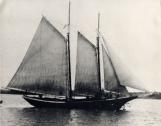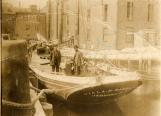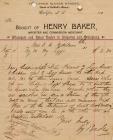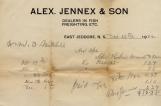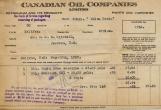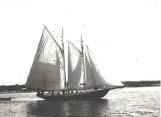1
Supplying the Store: by Schooner, Train, and TruckOver the 84 years that the Mitchell / Hosking store was in business, the task of supplying provisions to the store was undertaken by several methods, on both sea and land.
3
Although less than 50 kilometres east of Halifax, Oyster Pond was a remote village at the turn of the last century. By land, the journey from Halifax was along an often impassable muddy track. The only regular vehicle to come this way was the mail coach, which delivered the mail along the route from Halifax to Sheet Harbour, changing horses along the way.The main transportation of goods and people was by vessel, usually small schooners owned by local captains. These vessels had a variety of duties, including shipping cargo from Halifax, importing fish from Newfoundland, hauling produce from Prince Edward Island, and fishing for lobster and cod, haddock, and other fish in season.
5
This is the schooner Viola G. Hartlin docked in Halifax. The vessel was built and launched in 1910 by Captain Peter Hartlin (b.1854). Primarily a fishing vessel, it also carried freight. The vessel is remembered locally for having made the fastest trip from Jeddore Harbour to Halifax with a cargo on board; it took just under 4 hours.7
This early invoice gives an idea of the conditions onboard the small schooners and the difficulty of shipping fragile cargo.The invoice shows credit being given to Mrs. J.D. Mitchell for her trade of eggs to Henry Baker. From interviews conducted in the 1980s, local people recall the wrapping up of eggs in paper and taking them to the store in return for credit. Mrs. Mitchell then packed the eggs up and sent them to Halifax where she in turn received credit.
The note on the invoice from Henry Baker reads:
"By 30 Doz. Eggs $3.80. I am shipping on the schooner Rival 2 egg cases. I shipped you 2 egg cases the other trip. Only one of these came back. When you are shipping eggs, please try to put them in cases when you can because when they are packed in hay or straw if they get wet on deck they are all messed up. Above is the credit statement for the last lot (30 Doz.). I also sent you credit for the other lot by Captain Mitchell."
9
Several families operated out of Jeddore Harbour during the late 1800s and early 1900s. Some built their own vessels, while others purchased them, often from the nearby village of Chezzetcook.Alex Jennex owned several vessels during his lifetime including the "Helen Maud" and the "Wilfred Snow". It was common for these schooners and their crew to spend several month away, fishing off Cape Breton or Newfoundland, wherever the fishing was good. As the season closed, they would return home, just in time to set off for Prince Edward Island to purchase produce from the Island's farmers: carrots, potatoes, turnips and parsnips. The vegetables would be sold from the wharf, and many families bought enough to last through the long winter months (especially if their own crops had failed).
Below, in this 2004 interview, Mr. Mitchell describes how people stocked up in preparation for winter.
"Pretty well everybody would go to town once a year and get their winter supplies. So they would go to a wholesaler in town. What I can first remember would come by vessel, but after that it would come by truck. Howard Wentzell. That's where a lot of people. Now he would sell wholesale to the individual. So, pretty well everybody that had enough money accumulated to buy their winter supply would do it that way to save money.
I suppose in bulk, maybe food for you animals. You know, because it would come in 100 pound, 98 pound bags. That would be, I know for our hens they used to use cracked corn. And then something else was called middlings. And cornmeal. So probably each fellow would probably get ten bags of that. The flour you'd get by bag. And the other things, canned goods, you'd get by case. Maybe they'd sell you a half a case."
11
This invoice from 1922 shows that barrels of fuel were still being shipped via schooner, in this case the "Helen Maud" is the cargo vessel. The Helen Maud was owned by Alex Jennex of Jeddore.In a 1981 interview conducted by the Nova Scotia Museum, Garth Hosking recalls "...oil was brought in in 45 gallon barrels, and not all steel barrels - some of them were wooden barrels - and you usually had 15 to 20 of those..."
14
Vessels mostly brought shipments to the store from suppliers in Halifax who imported goods from elsewhere. However, if a vessel was coming from Newfoundland with a load of fish, it might also have brought seasonal goods such as foxberries. Many people remember getting foxberries from Willie O's store. They were a special treat carried in the fall, and came in barrels of water which kept them fresh for a long time. Although the foxberries are well remembered, invoices for their purchase or shipment have not been discovered yet in the records from the store. It may be that Willie O had a deal with a captain, for trade or barter that he did not record in the store's ledgers.Doris Hutt, in this 2004 interview, remembers running to the store for foxberries:
"And so when he had foxberries, you used to be able to get shortening in a five pound pail. You'd take your pail, over you'd go, and I said before, it was a puncheon, but really wasn't, it was just a barrel. It seemed like a big thing to me at the time. You'd scoop out and pay for your foxberries and away you'd go. Got them from Newfoundland, as far as I can recall. He would get a shipment of them in. Or whether he shared a shipment with somebody else. Or whether the boats came with the…a barrel for you and a barrel for the fellow next down the line. But he'd have more than one. Foxberry pies, foxberry tarts."
